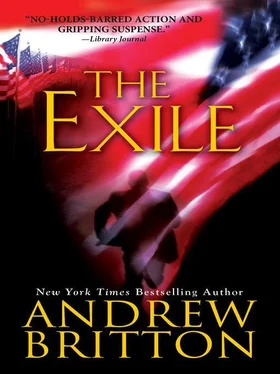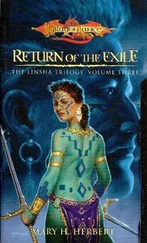Andrew Britton - The Exile
Здесь есть возможность читать онлайн «Andrew Britton - The Exile» весь текст электронной книги совершенно бесплатно (целиком полную версию без сокращений). В некоторых случаях можно слушать аудио, скачать через торрент в формате fb2 и присутствует краткое содержание. Жанр: Триллер, на английском языке. Описание произведения, (предисловие) а так же отзывы посетителей доступны на портале библиотеки ЛибКат.
- Название:The Exile
- Автор:
- Жанр:
- Год:неизвестен
- ISBN:нет данных
- Рейтинг книги:5 / 5. Голосов: 1
-
Избранное:Добавить в избранное
- Отзывы:
-
Ваша оценка:
- 100
- 1
- 2
- 3
- 4
- 5
The Exile: краткое содержание, описание и аннотация
Предлагаем к чтению аннотацию, описание, краткое содержание или предисловие (зависит от того, что написал сам автор книги «The Exile»). Если вы не нашли необходимую информацию о книге — напишите в комментариях, мы постараемся отыскать её.
The Exile — читать онлайн бесплатно полную книгу (весь текст) целиком
Ниже представлен текст книги, разбитый по страницам. Система сохранения места последней прочитанной страницы, позволяет с удобством читать онлайн бесплатно книгу «The Exile», без необходимости каждый раз заново искать на чём Вы остановились. Поставьте закладку, и сможете в любой момент перейти на страницу, на которой закончили чтение.
Интервал:
Закладка:
“What kind of money are we talking about?”
“A fraction of the DOD’s annual budget, but it’s enough to suit their purposes,” Harper said. “After the wire transfer to SB Holdings in Paris, the balance in the Cowan account was just under fifteen million dollars. I imagine the other commanders have access to similar figures.”
“How do you know this?”
“About the Cowan Group, you mean?” Harper smiled. “Before I was promoted out of Operations, the OMB accidentally sent me a copy of the report.” The OMB was a reference to the White House Office of Management and Budget, one of the least effective entities in the U.S. government. “This was when they were first setting up AFRICOM, so with all the paperwork flying around, it’s not surprising they slipped up. I filed the information away and destroyed the report. They caught the mistake eventually, but they had no proof I ever received it, so the whole thing was swept under the rug. They never bothered to open a new account.”
“They may have let it slide the first time around, but they’ll know something’s up if you sent this as an official request through the FATF.”
“It wasn’t official,” Harper said. “I’ve made a few friends on the task force, mostly because I gave them credit where credit was due. Thanks to my testimony in front of the Senate Intelligence Committee last year, they saw a big boost in their funding. They checked this out as a favor to me. There won’t be a paper trail.”
“So how does Nusairi figure in?” Kealey asked. “How did you find him to begin with?”
“Once I found out that David Khadir authorized the dispersal of the incoming funds in person, I convinced the bank president in Paris to give us the security tapes from the end of April.”
“With a little help from your Interpol friend?”
“And gratefully so,” Harper said with a nod. “I flew over and picked them up personally, though. The bank president was kind enough to point Khadir out, and we ran the tape through our face-recognition software. The search came up empty, but MI Five got a hit and sent us what they had.”
“The Security Service, Interpol…sounds like you’ve been having quite the house party for spooks,” Kealey said. “How do the Brits know Nusairi?”
“He was arrested in London a few years back for assaulting a police officer during a protest outside the Sudanese embassy. Put the bobby in the hospital. They gave him a light sentence…eighteen months…but he didn’t even do that much time. If I remember correctly, he was out in under a year.”
“Uh-huh.” Kealey’s mind was plainly working. “He must have some major family connections.”
Harper nodded. “His uncle was Khalil Osman-the businessman behind the Kenana sugar plantation. His father, a partner in the Kenana development, headed the Sudanese consulate in London for almost two decades.”
Kealey grunted. “Did he graduate from Oxford or Cambridge?”
“Oxford.”
“Law degree?”
“Social anthropology,” Harper said with a small grin. “For all his wealth and privilege, Nusairi was a vocal critic of Bashir who developed a groundswell of support among the poor people of Sudan. They tolerated him to a point, but when he went from advocating civil disobedience to inciting riots, his family intervened to keep him from being imprisoned or worse. And even then they eventually had to disown him to save face.”
“Which I’m sure only enhanced his popularity.”
“Exactly…He became a kind of folk hero,” Harper said. “The man who renounced all the advantages of birth to champion common causes. Give him credit-he had the courage of his convictions.”
“And a violent streak.”
“That too,” Harper said. “The Bashir regime deported him, of course, and from there he dropped off the grid. This is the first we’ve heard of him in a half decade.”
“What does Nusairi think of Omar al-Bashir?” Kealey wondered aloud.
“Well, the protest he was arrested at was a demonstration against Bashir’s regime, if that’s any indication. Specifically, they were protesting the ethnic cleansing in Darfur. That was about the time it really started to get into the news and everything. The genocide, I mean.”
“So five million dollars is wired from a secret DOD account to a Sudanese expatriate living in Marseille. Why? And where did it go from there?”
“Well, I’m sure Joel Stralen could give us the answers to those questions,” Harper said dryly, a trace of anger touching his voice. “But I doubt he will. Neither will the AFRICOM commander, though I’d be surprised if he knew anything more than we do.”
“So you want to ask Nusairi in Marseille,” Kealey said, coming directly to the point.
Harper looked at him. “Our most recent line on his whereabouts is that he’s in Africa now,” he said. “And I want you to talk to him.”
Kealey grimaced and started shaking his head. “I don’t-”
“Hold on,” Harper said, cutting him off before he could refuse. “There are a few other things you should know before you make your decision.” Reaching into his pocket, he withdrew the second photograph, glanced at it, and set it down on the table. Pushing it over, he said, “Do you know who that is?”
Kealey managed to avoid the photograph for a few seconds. But Harper could tell that he’d already heard too much. He could read the physical cues-a slight raising of his right eyebrow, the way he leaned forward in his chair.
Finally, Kealey looked down. The man in the picture had dark hair and narrow, friendly features, and wore steel-rimmed spectacles of the kind that looked as if they might have been issued during World War II. Though Harper knew it would have been more than ten years since Kealey had last seen the face, it was apparent he nevertheless recognized him at once.
His eyes opened wide, and his head jerked up. Staring at Harper, he said, “Where did you get this?”
“Khartoum. The image was captured by a security camera outside the embassy ten days ago. I take it you know him.”
Kealey nodded absently and looked back at the photograph. “I can remember teasing him about those glasses… It was one of our lighter moments in Sarajevo.”
“I’m sure they must have been few and far between.”
Kealey glanced up at Harper without comment, returned his attention to the snapshot. “He hasn’t changed much in fourteen years,” he said. “At least not noticeably. There are no gray hairs, no new wrinkles, not even a couple of extra pounds.” He sat lost in thought for a moment, then shook his head and looked up. “What’s Cullen White doing in Khartoum?”
“We don’t know yet,” Harper said. “But we have some ideas, thanks to our man in Khartoum. His name’s Seth Holland…”
Harper explained how Holland had talked the detachment commander into turning over the MSG’s security footage, despite the ambassador’s orders to the contrary. He explained how Holland and White had worked together briefly back in ‘95. The event that brought them together was the interrogation of a Serb general captured in Srebrenica in the closing months of the Bosnian War. Given the fourteen-year gap and White’s minor role in the interrogation, it wasn’t surprising that Holland hadn’t been able to put a name to the face. But that didn’t matter, as White was quickly identified when the recordings were sent via an encrypted link to Langley. A twenty-year veteran of the Operations Directorate picked him out just by looking at a still image from the embassy’s cameras, and the Agency’s bio-metric identifiers proved the officer right. The only thing they hadn’t been able to figure out was why White had met with Walter Reynolds in the first place.
Читать дальшеИнтервал:
Закладка:
Похожие книги на «The Exile»
Представляем Вашему вниманию похожие книги на «The Exile» списком для выбора. Мы отобрали схожую по названию и смыслу литературу в надежде предоставить читателям больше вариантов отыскать новые, интересные, ещё непрочитанные произведения.
Обсуждение, отзывы о книге «The Exile» и просто собственные мнения читателей. Оставьте ваши комментарии, напишите, что Вы думаете о произведении, его смысле или главных героях. Укажите что конкретно понравилось, а что нет, и почему Вы так считаете.










